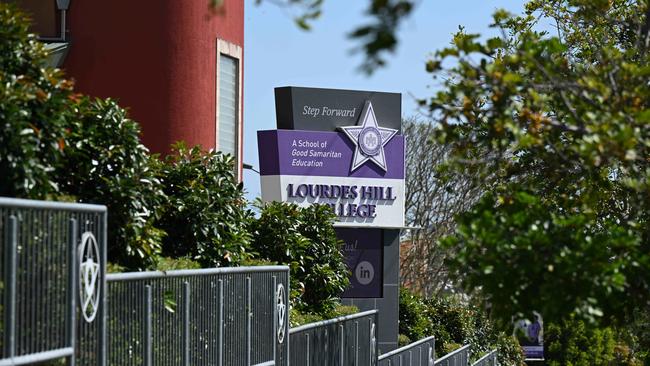Opinion: There’s an insidious problem in our all-girls’ schools
We have a problem in our all-girls’ schools. Children are suiciding as bullying trumps respect, and it is more insidious now because of social media, and questions must be asked of all schools, writes Kylie Lang.

Kylie Lang
Don't miss out on the headlines from Kylie Lang. Followed categories will be added to My News.
We have a problem in our all-girls’ schools.
You only need to look at the musical chairs going on between these expensive private institutions to know students – and their parents – are not happy.
Kids are being pulled out of one big-name school and sent to another, while principals follow the unspoken rule of accepting them.
But changing schools is just geography. The problem remains, and families are being destroyed.
Children are suiciding as bullying trumps respect. It’s achingly sad and surely avoidable.
Bullying has always existed – among boys as well – but it is more insidious now because of social media and the apparent inability of schools to do anything about it.
All schools have policies against bullying and espouse a zero-tolerance stance. But policies are worthless without meaningful action.
I know many teachers who’ve called out anti-social behaviour only to find their principals unwilling or ill-equipped to deal with it.
They prefer the “nothing to see here” approach. It’s politics in an educational environment.
Long have we known some girls can be nasty, cliquey and vengeful but now they are weaponised like never before. Their online attacks follow victims into their own homes, which are no longer safe zones.
Bedrooms that were once sanctuaries are now torturous places as bullies infiltrate via screening devices, hounding the vulnerable even if they swap schools.
Parents complain of feeling helpless and outplayed.
Even the most attentive can miss things, and taking away devices doesn’t necessarily fix the issue. In some cases, it can exacerbate a child’s feeling of isolation.
The tragic suicide of 12-year-old Ella Catley-Crawford has, once again, shone a harsh spotlight on the ramifications of social media abuse.
When Ella was a student at Lourdes Hill College in Brisbane earlier this year, she allegedly became the victim of an online catfishing scheme orchestrated by girls who shared her photos online.

On October 27, the bright Year 7 student, who had been moved to the co-ed Redlands College in Wellington Point, attempted suicide. She died in hospital a week later.
Since then, many parents have come forward, raising allegations of a toxic culture at Lourdes Hill. Some have told of removing their children out and enrolling them elsewhere.
On the flip side, I know parents who’ve deliberately chosen to send their kids to Lourdes Hill after harrowing experiences at other all-girls’ schools.
The problem is not as simplistic as being school specific.
Questions must be asked of all schools.
What processes are in place to tackle bullying? Are they effective and if not, why not?
How can teachers be better supported to stamp out anti-social behaviour?
How can families be better incorporated in working with schools to keep kids safe?
In short, how can processes be improved so that they actually work?
Because here’s another thing.
If bullying goes unchecked, the bullies lose as well.
Patterns of cruelty form and negative ways of interacting with others become entrenched, setting these kids up for a life less fulfilling.
You only have to look at workplaces to identify adults who got away with awful behaviour as kids. Social environments are increasingly dangerous and distressing – and it should never have come to this.
How is it, in a supposedly civilised society such as ours, that when you call a service provider you’re hit with a mandatory warning that being disrespectful to staff won’t be tolerated?
How is it, in bricks and mortar stores, that piped music is regularly interspersed with a voice telling you to “be kind to our people”?
Why are our roads death traps due to entitled drivers hellbent on intimidating others?
And consider this: these adults perpetuating ugly behaviour did not grow up with social media. Facebook arrived in 2004, Instagram in 2010 and Snapchat the year after.
The damage these and other online platforms have done in just two decades is staggering – so how much worse will things be if today’s little thugs are not brought into line?
So much more needs to be done to tackle bullying, a scourge that has been allowed to rage out of control, and schools must seriously step up.
Kylie Lang is associate editor of The Courier-Mail
kylie.lang@news.com.au



